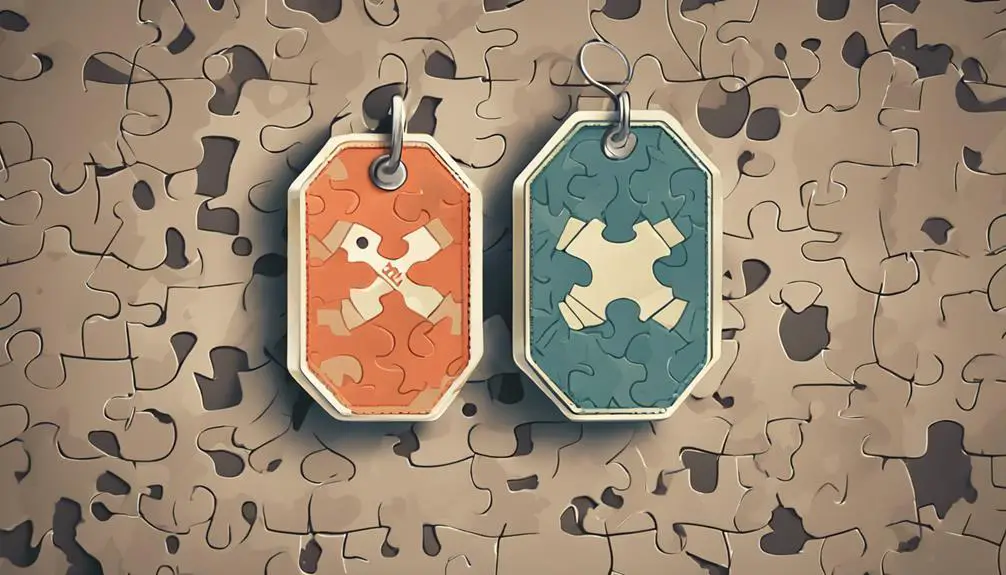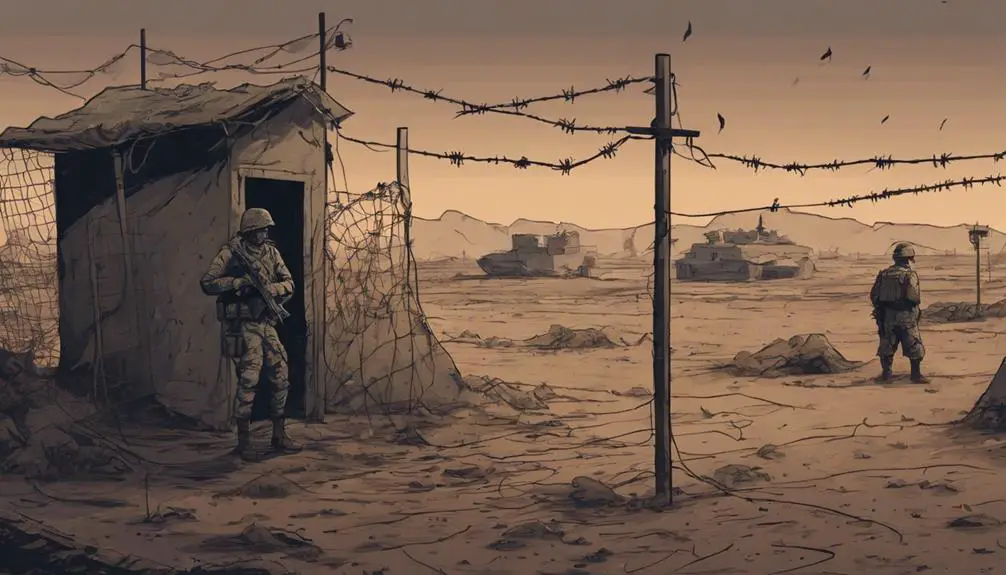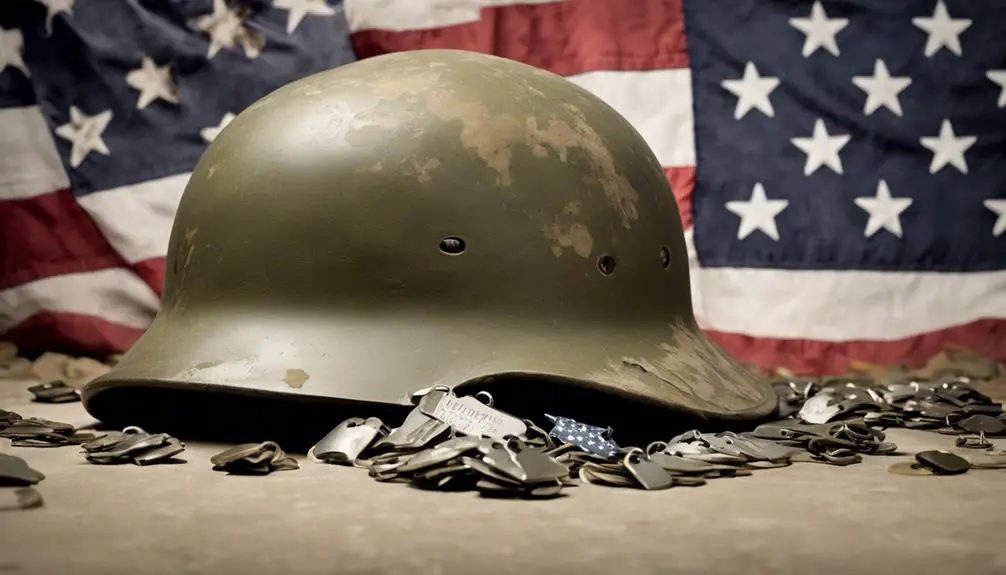You've heard the term "FOB" tossed around in military contexts, but what's behind the acronym? In the military, FOB stands for Forward Operating Base, but it's evolved to encompass a unique language and culture that's essential to military camaraderie. From "Hooah" to "RTO," slang terms facilitate swift communication on the battlefield. Immersion in FOB culture reveals insider phrases, acronyms, and jargon that separate insiders from outsiders. As you explore the world of FOB, you'll uncover the significance of shared experience, the importance of FOB lingo, and the impact of FOB culture on military identity. There's more to uncover – and it starts here.
Decoding FOB Acronyms and Abbrevs

When interacting with military personnel or reading military literature, you'll frequently encounter FOB acronyms and abbreviations that can be confusing without a decoder ring. The sheer volume of acronyms can be overwhelming, but understanding their evolution is vital to deciphering them.
The acronym evolution in the military is a continuous process, driven by the need for brevity and clarity in communication. As new technologies, tactics, and strategies emerge, new acronyms are born. This rapid adaptation demands a codebreaker mindset, where you're able to piece together seemingly cryptic combinations of letters to uncover their meaning.
To develop this mindset, it's important to recognize that acronyms often follow a logical pattern. Many are derived from the first letter of each word in a phrase or name, while others are abbreviations of longer phrases. By recognizing these patterns, you can begin to decipher even the most obscure acronyms.
With practice and patience, you'll develop a codebreaker mindset, effortlessly navigating the complex world of FOB acronyms and abbreviations.
Slang of the Battlefield
You'll encounter a unique language on the battlefield, where slang terms like 'Hooah' and 'Oorah' become integral to military communication. This language is essential for swift and effective communication, often making the difference between life and death. Battlefield banter and war zone wisecracks are an integral part of military culture, serving as a coping mechanism for the stresses of combat.
Here are some examples of slang terms used on the battlefield:
- Hooah: an expression of excitement, agreement, or motivation.
- Oorah: a Marine Corps battle cry, used to express enthusiasm or solidarity.
- RTO: a radio telephone operator, responsible for communication in the field.
- SITREP: a situation report, providing critical information on the battlefield.
These slang terms and acronyms are essential for efficient communication in high-pressure situations. By using these terms, military personnel can quickly convey complex information, making it easier to stay focused on the mission at hand.
As you navigate the language of the battlefield, you'll gain a deeper understanding of the unique culture and camaraderie that exists among military personnel.
Secret Language of FOB Insiders

At Forward Operating Bases (FOBs), insiders rely on a secret language to traverse the intricate social hierarchy and decipher effectively in high-stress environments. You're part of an exclusive group, and this language is your key to insider status.
As you immerse yourself in FOB culture, you'll pick up on phrases and slang that might seem cryptic to outsiders. This secret language is woven into the fabric of FOB life, allowing you to quickly identify friend from foe.
As you earn your stripes, you'll begin to grasp the nuances of FOB identity. You'll learn to decipher the lingo, and your insider status will be solidified. This shared language creates a sense of belonging, separating those who 'get it' from those who don't.
You'll find yourself using terms like 'Fobbit' or 'Cyclops' to describe your fellow soldiers, and it'll become second nature to refer to your base as 'the FOB.'
In this exclusive world, language is power. Mastering the secret language is key to traversing the complex social dynamics of FOB life. As you become more fluent, you'll reveal the secrets of FOB culture and solidify your place within the insider community.
The Birth of FOB Colloquialisms
As you become fluent in FOB slang, you start to wonder how these colloquialisms emerged in the first place, and what role they play in shaping the unique culture of Forward Operating Bases.
The birth of FOB colloquialisms is a fascinating story that reveals the creative and adaptive nature of military personnel. FOB etymology is deeply rooted in military culture, where the need for efficient communication and camaraderie led to the development of a distinct language.
Here are some key factors that contributed to the emergence of FOB slang:
- Acronyms and abbreviations: Military personnel rely heavily on acronyms and abbreviations to convey complex information quickly.
- Slang from previous conflicts: FOB slang draws from the linguistic heritage of past wars, incorporating terms and phrases from previous military conflicts.
- Cultural exchange: Military personnel from different countries and backgrounds bring their own slang and colloquialisms to the FOB, enriching the linguistic landscape.
- In-group identity: FOB slang serves as a badge of identity, distinguishing insiders from outsiders and fostering a sense of community among military personnel.
Military Jargon in the FOB

In the FOB, military jargon serves as a common language, allowing personnel to convey complex information quickly and efficiently. You'll often hear terms like 'SITREP' (situation report) and 'OPS' (operations) thrown around, and it's not uncommon to see acronyms like 'FOB' (forward operating base) and 'CO' (commanding officer) plastered on signs and documents.
This specialized language is an integral part of FOB culture, and it's what sets military personnel apart from civilians. As you navigate the FOB, you'll start to pick up on the unique terminology and lingo that's woven into everyday conversations. It's not just about using fancy words, though – this jargon is a key part of military identity.
It's a way for personnel to signal that they're part of an exclusive group, one that's bound together by shared experiences and a common purpose. By using military jargon, you're not just communicating information – you're also affirming your place within the military community.
Lost in Translation FOB Style
You'll quickly realize that not everyone speaks the same language, even when they're speaking the same language, when you're surrounded by military personnel from different countries or backgrounds in the FOB. Cultural differences and language barriers can lead to misunderstandings, miscommunications, and even cultural missteps.
In a high-stress environment like the FOB, these miscommunications can have serious consequences. Here are a few reasons why language barriers can be particularly challenging:
- Idioms and colloquialisms: Phrases that are common in one culture may not translate directly to another, leading to confusion.
- Technical jargon: Military terminology can be complex, and differences in terminology can cause misunderstandings.
- Accents and dialects: Different accents and dialects can make communication difficult, especially in noisy environments.
- Non-verbal cues: Cultural differences in non-verbal cues, such as body language and hand gestures, can also lead to misunderstandings.
Being aware of these potential language barriers can help you navigate the complexities of communication in the FOB. By being mindful of these challenges, you can take steps to avoid miscommunications and ensure effective collaboration with your teammates.
Declassified FOB Lingo Explained

While maneuvering through the complexities of communication in the FOB, it's helpful to familiarize yourself with the unique slang and terminology that's commonly used in this environment. As you navigate the world of FOB lingo, you'll discover that it's a language that's constantly evolving.
The FOB Etymology is rooted in military jargon, but it's also influenced by cultural and regional dialects.
The Lingo Evolution in FOB slang is a fascinating process. New terms and phrases emerge as soldiers adapt to changing circumstances, and existing ones fall out of use.
For instance, the term 'FOB' itself originated from the military's use of 'Forward Operating Base.' Over time, it's evolved to encompass a broader meaning, encompassing not just the physical base but also the community and culture surrounding it.
Understanding the nuances of FOB lingo is essential for effective communication. It's not just about speaking the same language; it's about being part of a shared experience.
Frequently Asked Questions
Can Civilians Use FOB Slang Without Being Considered Disrespectful?
You're wondering if you can use military slang without being disrespectful. The short answer is, it's complicated.
When you adopt language from a culture that's not your own, it can be seen as cultural appropriation. It raises questions about language ownership and who's the right to use certain terms.
Before using military slang, consider the context and potential implications. Be respectful and aware of the origins and meaning behind the words you use.
Are FOB Slang Terms Used Universally Across All Military Branches?
You're trying to get a bead on whether military slang terms are used uniformly across all branches. The answer is, it's a mixed bag.
While some terms like 'FOB' (Forward Operating Base) are widely used, others are unique to specific branches or have different meanings depending on the cultural significance.
Branch variations exist, and what flies in the Air Force mightn't in the Navy. It's not a one-size-fits-all deal, but rather a patchwork of slang that's woven into the fabric of each branch.
Do FOB Slang Terms Change Frequently or Stay Consistent Over Time?
You might wonder if slang terms change frequently or stay consistent over time.
In general, slang terms often exhibit evolution patterns, with new words and phrases emerging as language drift occurs. This natural process is driven by cultural and social changes.
In the context of FOB military slang, terms may adapt to new operations, technologies, or personnel, but some core phrases remain consistent, reflecting the community's shared experiences and values.
Is FOB Slang Used More in Certain Military Roles or Environments?
You might think that military slang is used universally across all roles, but that's not entirely true.
In reality, certain military roles and environments tend to use slang more frequently. For instance, you'll hear more slang in Combat Zones where troops rely on quick, cryptic communication.
Specialized Units, like sniper teams or Special Forces, also develop their own lingo to maintain operational security.
Can FOB Slang Be Used in Formal Military Communications or Reports?
When it comes to formal military communications or reports, you're expected to adhere to formal protocols. Official language is a must, avoiding colloquialisms and slang.
In this scenario, using fob slang would be inappropriate, as it's not part of the standardized language used in official documents. You'll need to stick to formal language to guarantee clarity and maintain professionalism.
Conclusion
You've cracked the code of FOB military slang, deciphering acronyms and colloquialisms that once seemed like a secret language.
Now, you can navigate the battlefield of bureaucratic red tape and communicate like a seasoned veteran.
Remember, when in doubt, just 'ROE' (Rules of Engagement) and adapt.
Like a soldier in a foreign land, you've found your footing in the uncharted territory of FOB jargon.
Mission accomplished.







